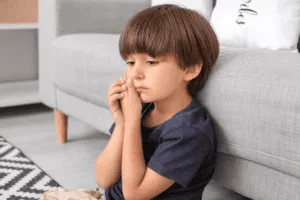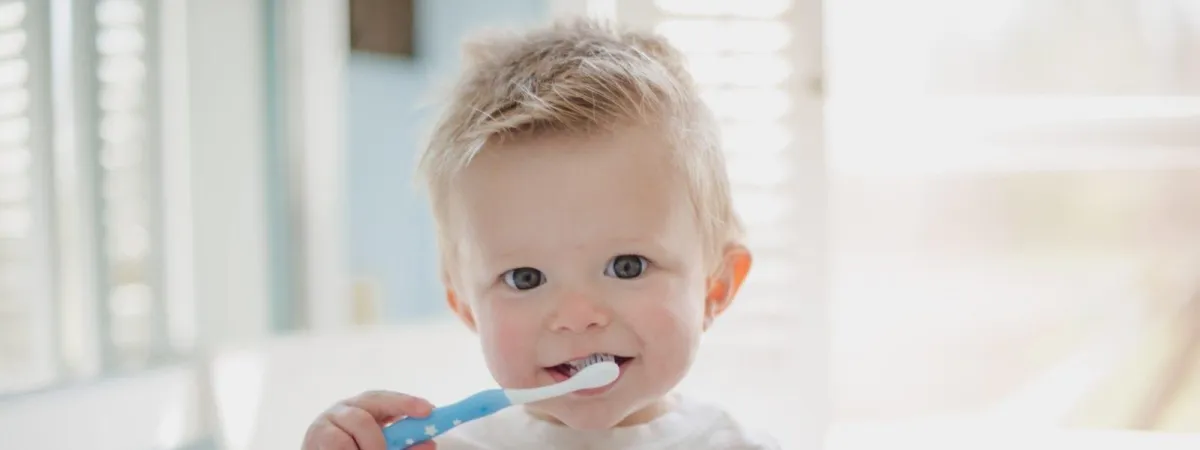Read All About It
Dental Related Articles


First Dental Visit: When To Go and What To Expect for Children
A question we often hear is, “When should my child first go to the dentist and what should we expect on that day?” Read on to see just when you should take your child to the dentist and what the initial visit to a pediatric dentist may be like.
When Should Your Child Have Their First Dental Visit?
The American Academy of Pediatric Dentistry recommends your child’s first visit to the dentist should occur within six months after your child’s first tooth appears, but no later than by the child’s first birthday.
You may be wondering, though, when your child will get their first teeth. From birth, children usually have 20 primary teeth partially formed under the gums. The first teeth tend to erupt and come in through the gums from the age of six to 12 months. Beyond that, most children will have their full set of primary teeth by age three.

It’s important to take care of those primary baby teeth for many reasons, including the fact that decay in the baby teeth can sometimes lead to decay in the permanent teeth. Establishing a routine visit to the dentist for your child is not only recommended but prudent. But what can you expect when you get there?
What Should You Expect During Your Child’s First Trip To The Dentist?
All pediatric dentists have their own unique ways of welcoming a child for their first dental visit and making them feel comfortable while they are there. The experience sometimes starts outside the office with colorful signage on the building or door.
Once inside the office, the waiting room can be transformed into a place of play with books, board games, building sets, and video games. A lot of offices will hold drawings to engage the kids. For example, having a large glass jar filled with marbles (or anything that’s fun to count) and slips of paper with pencils on a table, so kids can guess the number of items in the jar, enter the contest, and qualify to win a prize.
Making the visit fun for your child is the goal to decrease resistance to visiting the dentist in the future. The dental office staff play a huge role in making the visit pleasant for your child. Assistants should be friendly, engaging, and physically be down at the child’s level to interact one-on-one with them.
What Is Involved In The First Dental Exam?
When your child is called back for their dental exam and cleaning, expect the hygienist to greet you with a smiling face and happy tone of voice. The hygienist will normally welcome you, introduce themselves to you (AND to your child) and then show you to an exam room.
At this point, because the dental tools tend to be intimidating to a young one (and even some adults), most hygienists will make a game of introducing and explaining the equipment that dentists use. They may start by asking if your child has any troubles in their mouth or if their teeth are hurting and whether they brush and floss.
Then, they might ask if your child knows how many teeth they have. This is a great ice breaker, because kids love to count. The hygienist will generally get their ‘teeth counting tool’ (just a pick) and make a huge deal of counting all the teeth on the top and all the teeth on the bottom, and say something like, “Wow! You have ten teeth on top and ten on the bottom. Do you know how many teeth that is in total? You have 20 teeth!!”
The hygienist may use words and phrases your child can relate to. For example, when the cleaning and exam starts, your child’s exam chair will be tilted backwards and down, which can be scary for a child. This is the perfect opportunity for your little one to ‘go on a space adventure in a rocket’. And to get a reluctant child to open wide enough for the exam, you may hear, ‘Open your mouth big, like a hippo, for me.”

Cleaning and polishing teeth is done by the “tooth tickler.” The instrument used to rinse, remove water and paste, and blow air is either a ‘squirt gun’, an ‘elephant’s trunk” or a ‘tooth dryer’ (similar to a hair dryer) depending on its function at the time. Floss helps to remove the ‘sugar bugs’ from between the teeth. And fluoride varnish is usually a “superhero protection paint.”
When it comes time for X-rays, hygienists call the protective shield a ‘heavy blanket’ and may joke that it weighs more than your child. Actually taking the X-rays is compared to taking movie star glamour shots or something similar. You get the idea.
Anything to calm your child’s fears and keep the appointment experience fun is the end goal, so that future appointments will be looked forward to. Some pediatric dental offices will even show movies or cartoons on a screen in the waiting room or in the exam room to help alleviate anxiety.
Of course, the dentist will come and examine your child after the cleaning. This can be an area of uncertainty and transition for your child, so a lot of dentists will offer prizes from the treasure chest for being a good patient.
Your child may also receive a bag filled with helpful items designed to encourage your child to brush and care for their teeth properly. Colorful toothbrushes, toothpaste, floss picks, timers, toy prizes, and even story books about trips to the dentist may be included. Your child may be encouraged to use the timer while they brush their teeth for two minutes, two times per day (Or they can sing their ABC’s in their head, twice!).
Tips For Your Child’s First Dental Visit
As soon as your child gets their first tooth, go ahead and schedule an appointment close to their first birthday.
Schedule an appointment during the time of day that is best for your child, when they are most calm, rested, and cooperative.
If you fear the dentist, don’t show that anxiety to your child. Stay positive and trust in your pediatric dental professional.
Don’t use bribes to entice your child to go to the dentist nor use a trip to the dentist as a form of punishment.
Preventive Care Can Lead To A Lifetime of Dental Health
Just like with a well-baby check at the doctor, bringing your child to the dentist at a very early age can help to establish positive dental care routines that will ensure oral health over a long period of time. Setting up your child’s dental home in advance is a wise idea should issues involving their teeth arise, either cavities or injuries.

Good dental health practices can save your child from potentially painful future procedures and save you time and money in the long run. Most importantly, working with a pediatric dentist that can put your child at ease and make them want to go to the dentist may be a key factor in whether your child partakes in dental healthcare throughout their life.
To discuss any concerns you may have about your child’s first trip to the dentist, contact us here at Hurst Pediatric Dentistry or call us at (205) 969-7454.

19 INVERNESS CENTER PARKWAY, STE 250, BIRMINGHAM, AL 35242
TEL: 205.969.7454
E-MAIL: [email protected]
2018 © ALL RIGHTS RESERVED | PRIVACY POLICY | TERMS AND CONDITIONS
Site by Trustway Marketing Powered by Kyrios Systems